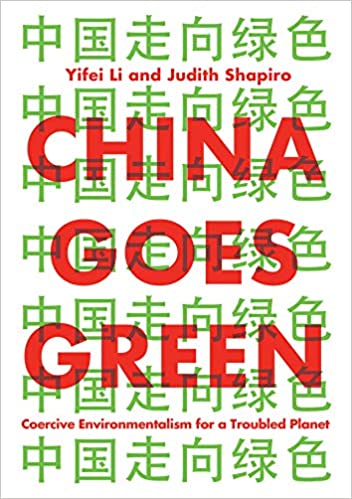
Review of China Goes Green: Coercive Environmentalism for a Troubled Planet by Yifei Li and Judith Shapiro. Polity, 2020.
One can fault China’s leaders for many things, but rarely for lack of a plan. Xi Jinping’s declaration before a virtual convening of the UN General Assembly this fall that the country would aim for carbon neutrality by 2060 is a case in point. While the target’s ambition was matched by the absence of meaningful detail about how it would be reached, China’s commitment nonetheless raised global hopes that the world may yet avert environmental catastrophe. That is because of the perception that China’s authoritarian political system is uniquely able to take decisive and effective action.
But as the environmental researchers Judith Shapiro and Yifei Li explain in their new book, China Goes Green, this perception is largely unwarranted. Yes, the Party has nominally embraced environmentalism, but often as a means to “strengthen the authority and reach of the state” and, frequently, with negative environmental consequences.
China’s growth has come at tremendous environmental cost for a country that was already ecologically fragile in terms of its access to water and arable land. Environmental mismanagement increasingly threatened the legitimacy of a government that had focused too narrowly on growth alone. Since 1996, Shapiro and Li cite other research that “environmental mass incidents” grew 29% annually, leading the State Council to finally commit that from 2017 onwards its cadres would be held to account on a greater proportion of environmental targets than economic ones.
In the elevation of the environment to the top of the country’s agenda, Shapiro and Li find greater evidence for the failures of China’s political system than its successes. “Ecological migration” is a thinly-veiled pretext for the forced assimilation of China’s ethnic minorities while “green grabbing” is a variation on local governments’ often corrupt incentive to appropriate land. Policies hastily copied from one region to another, such as the mass planting of trees, can backfire as the species chosen, principally for the speed at which they grow, compound water scarcity problems. The falsification of data and dependence on top-down campaigns endemic to other policy areas are at play here too. Where there are successes, it has typically involved engagement and empowerment of local stakeholders that CCP apologists insist is the norm but is in fact all too rare.
Like the political system it critiques, the book is not without its miscalibrations. Environmental management is a wicked problem – transcending the science of the discipline itself to touch upon politics, economics, international affairs, cultural norms and the most personal of decisions. Shapiro and Li acknowledge all of these dimensions but rarely with the full attention any deserve.
In politics, the authors briefly summarize the Ministry of Ecology and Environment’s rise to prominence after a series of bureaucratic upgrades, but could have done more to elucidate how China’s institutions act at cross-purposes. In economics, the authors acknowledge the ecological implications of industrial overcapacity and inefficiency, but insufficiently focus on China’s aggressive investments in green technologies that, environmental benefits notwithstanding, are also pursued for their ability to increase the world’s technological and economic dependence on China. In international affairs, Shapiro and Li conclude that the “Belt and Road Initiative has the potential to be an environmental and social disaster,” citing a 2019 Greenpeace study that found China has supported coal production at five times the rate of wind and solar. But they under-examine other geopolitical factors at work. For instance, in their discussion of hydropower, the authors only fleetingly reference how damming can create a chokehold over downstream Southeast Asian nations.
The book’s discussion of sociocultural considerations is also anemic. The authors assert that CCP environmentalism has more in common with Maoist visions of “nature conquest” than traditional Chinese philosophical and ethical systems’ emphases on harmonic coexistence with nature. But they neglect how China’s leaders remain motivated by a historical context in which empires fell for their failure to manage natural disasters, particularly floods, which were seen as a mark of celestial disfavor. And while the authors acknowledge the relative success of campaigns against the exotic wildlife trade, it remains unclear how China’s people will reconcile their ever-demanding consumerism with their aspirations for a better environment.
Finally, China Goes Green gives limited guidance on how China might respond to two essential questions. The first is whether China would obstruct movement towards a carbon border tax, as the European Union and a potential Biden administration are poised to do, or embrace it, as the country once used its entry into the World Trade Organization to spur further domestic progress. The second is China’s role in geoengineering. While the country officially adopts what Shapiro and Li term a “precautionary approach,” the country has raced ahead of global ethics in other domains such as artificial intelligence and genetic engineering. It is not inconceivable that China might use potential mastery of geoengineering technology to advance its interests at the expense of other nations.
Despite its limitations, China Goes Green does put to rest any notion that China’s authoritarian model should be countenanced, let alone embraced for supposed salutary environmental effects. The question that continues to vex the world’s leading nations is how to balance the pursuit of cooperation with China on climate when they are increasingly at odds on nearly every other issue. The answer is to reject this as a false dichotomy. Indeed, a world that succeeds in compelling greater reciprocity from and competing more effectively against China will be one that makes greater environmental progress. Domestically, China’s leaders should embrace environmentalism as an opportunity to reform its political and economic systems – not reinforce their worst faults. If China wishes to use the environment as a basis for its claim to global leadership, it will have to do better.